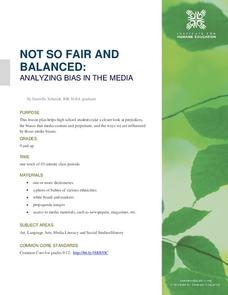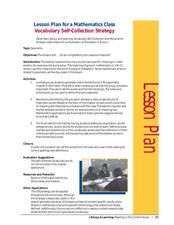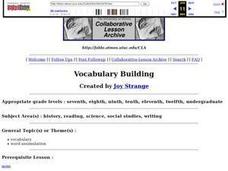Shodor Education Foundation
Introduction to the Concept of Probability
Acquaint mathematicians to the concept of probability with a discussion about the results of a game. Then have them play a dice, card, spinner, or coin game and recording the number of wins vs. the number of tries on an interactive web...
Curated OER
Vocabulary Building
Use primary text documents to learn word roots. Learners listen to a reading of the Declaration of Independence and highlight words they don't know. They compile these words and guess their meanings. They discuss roots, prefixes,...
Curated OER
Locating Information Quickly in a Variety of Resources
Here is a lesson which may be best suited for a library science teacher, or one that can be done by a regular teacher when in the library. In it, learners explore the best ways to use print and electronic resources to find information...
Council for Economic Education
China - Where Will They Fit in the World Economy?
Teach scholars why China is so crucial to global economics through an informative resource. Activities include using databases to search for information, watching a video or listening to a podcast, and reading about China's economy as a...
Utah Education Network (UEN)
7th Grade Poetry: Ode Poem
Walt Whitman's "Captain, My Captain" and Robert Frost's "The Road Not Taken" provide seventh graders with examples of odes. After reading and discussing these and other examples, young poets craft an ode and respond to the ode of a...
Institute for Humane Education
Not So Fair and Balanced: Analyzing Bias in the Media
Life is not always fair. Who's heard that before? This same concept moves to a larger scale using prejudice and bias. Pupils discuss where prejudice attitudes derive and how they develop throughout life. Reading comprehension...
Curated OER
ABC and 1-2-3 Farming
Students demonstrate how to alphabetize animal names. In this word study lesson, students identify animals that live on the farm and conduct a favorite farm animal survey. Students order animal pictures in alphabetical order.
Curated OER
How to Make a Rock
Second graders watch demonstrations and conduct experiments that show the three different types of rocks: igneous, sedimentary, and metamorphic.
Curated OER
Picture Dictionary
Students create picture dictionaries to encourage the development of letter-sound recognition. In this alphabet project, students cut out pictures from magazines and glue them onto tagboard, and then write the name of the picture below...
Curated OER
The Visual Thesaurus and the SAT
Demonstrate strategies for tackling unfamiliar vocabulary words in preparation for the SAT. Using Visual Thesaurus computer software, middle and high schoolers interpret contextual clues, solve sample sentence completion questions, and...
Texas Education Agency (TEA)
Geometry in Architecture #1
Discover how to analyze architecture from a geometric standpoint. The fourth installment of an 11-part unit on architecture first provides a presentation on axis, balance, basic form, formal, pattern, proportion, symmetry, and tripartite...
Curated OER
Global Hunger and Malnutrition
Is there a difference between hunger and malnutrtion? Is this a problem only in third world countries? How does hunger and malnutrition affect the community? Why do these problems exist when the world produces enough food to feed...
Curated OER
Vocabulary Self-Collection Strategy
Dedicate one or two class periods to creating a class glossary of geometry terms. Many geometry terms also appear in our every day vocabulary, but they have very different meanings. For example, the word gross in geometry is very...
Curated OER
Ecuadorian Rainforest
Have your class talk about the importance of the rainforest and the products that come from it. Learners watch a video showing the path of chocolate from the rainforest to the supermarket. They discuss how the rainforest and...
Curated OER
Dictionary Details
This clever lesson has students practice finding a variety of types of information in a dictionary by playing a "Dictionary Scavenger Hunt" game. Students must use the guide words at the top of a dictionary page, determine what part of...
Curated OER
How Cell Phones Work
Fifth graders are introduced to the text, LITERACY LINE viewing the contents page. They review the definition of explanatory writing; discussing the features used and complete a KWL chart to identify what they already know about how a...
Curated OER
Clown or Comedian
Students discover how to compare and contrast the differences between a clown and a comedian. They use dictionaries to expand their vocabulary.
Curated OER
Reference Resources: Being a Good Detective
Students explore a variety of reference resources while seeking information. atlases, almanacs, dictionaries, encyclopedias, thesauri, and online search engines as well as library card catalogs are utilized in this lesson.
Curated OER
Food Dictionary - Harvest Festival
Young scholars explore healthy foods and dictionary organization. Students create a list of healthy foods. They construct their own food dictionary, with illustrations. Young scholars model how a dictionary page should be filled with...
Curated OER
Pretending with Prefixes
The book Fortunately provides an excellent opportunity to discuss prefixes and suffixes as they appear in context. The class goes over a list of prefixes and suffixes with the teacher. They then write two sentences; the first...
Curated OER
New Hampshire Unplugged
Young historians explore how technology and science affected life in the state of New Hampshire. They define technology and give personal experiences of how technology affects people and how people have used technology. They compare the...
Curated OER
Mythological Word Origins
No wonder the ship was called the Titanic. An investigation of Norse, Roman, and Greek Mythology provides insight into mythological characters and corresponding words in the English language. A close look at roots, prefixes, and suffixes...
Curated OER
Measurement: Finding Areas of Rectangles
Gardening geometers construct the formula for the area of a rectangle by viewing a video revolving around two young people, their lawn mowing business, and their need to charge by the square meter. A relevant real-life application lesson!
Curated OER
Vocabulary Building - Declaration of Independence
Young scholars read the first part of the Declaration of Independence and mark the words they don't know. First, they try to guess what the words mean by looking at the them in context, and then they look up the words in a dictionary.























